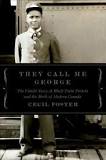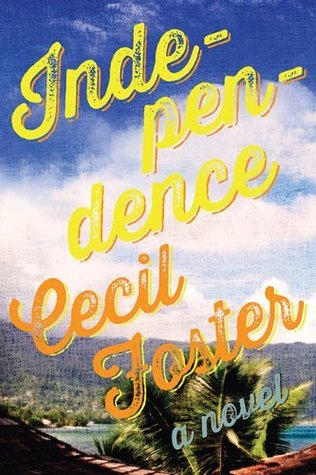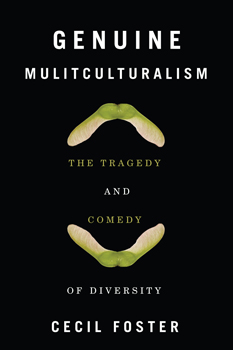Canadian Notes & Queries: Hey Porter

A Listing of articles featuring the work of Cecil Foster









...we’re eagerly awaiting February 5 and the Canadian publication of our first 2019 title: Cecil Foster’s They Call Me George: The Untold Story of Black Train Porters and the Birth of Modern Canada. Foster’s history documents the struggles, both individual and collective, of Black Canadians against the racist policies of their employers and their country. It was their actions, Foster argues, that laid the groundwork for the multicultural nation we know today. Incorporating the author’s own interviews with former porters and outlining the rarely-discussed institutional racism of early Canadian immigration and employment policies, They Call Me George is an indispensable read for the 21st century.
 For Immediate Release: Wednesday January 14th, 2015, 9:00 a.m. EST
Introducing the Five-Member Jury Panel for the 2015 Scotiabank Giller Prize
For Immediate Release: Wednesday January 14th, 2015, 9:00 a.m. EST
Introducing the Five-Member Jury Panel for the 2015 Scotiabank Giller Prize
Publisher’s Weekly – Independence: Book Review
Both abandoned by their mothers to the care of their grandparents, Bajans Christopher Lucas and Stephanie King are life-long friends. Discord arrives in 1966 in the form of the predatory Mr. Lashley, who takes a disquieting interest in 14-year-old Stephanie, lavishing gifts and attention on the teenaged girl. Conversations Christopher is too inexperienced to understand...
Read more
Guest Feature – Who owns a country? – Mcgill-Queen’s University Press
Who owns a country? This is one of the burning questions that confront us daily as modern individuals and even as nations and states. It is a question that is never far below the surface in any discussion, among others, about Quebec, Scotland, Catalonia, Sri Lanka, England, Germany, or as we are witnessing these days via...
Read more
Foster Talks Independence – Tony Best
Cecil Foster was recently featured in this article by Tony Best.
Foster Talks Independence
...
Read more
Buried in Print – Cecil Foster’s IndependenceCecil Foster’s Independence (2014)
Desmond has returned to the island because the prime minister has asked those who went abroad to help rebuild the nation, now that it has gained its independence.
Read more
 Harper Collins Publishers, 2014
Cecil Foster’s experience is not unlike Desmond’s, but Independence is rooted in the...
Harper Collins Publishers, 2014
Cecil Foster’s experience is not unlike Desmond’s, but Independence is rooted in the...
The National Post Review: Independence – Donna Bailey Nurse
Special to National Post - February 14, 2014
 Independence
Growing up in, Bridgetown, Barbados, where he was born in 1954, Cecil Foster much preferred cricket to reading. Nevertheless, once a week his... Independence
Growing up in, Bridgetown, Barbados, where he was born in 1954, Cecil Foster much preferred cricket to reading. Nevertheless, once a week his...
Quill & Quire – Review of Independence
Cecil Foster was 12 years old in 1966 when Barbados gained independence from Britain. Foster’s first novel in almost a dozen years delves into the formative period of the newly liberated nation, as seen through the eyes of 13-year-old Christopher Lucas.
Like his childhood friend and neighbour Stephie, Christopher is a “grandmother chile,” raised under old-fashioned...
Read more
Welcome Back Cecil Foster
Featured Post by Heman Silochan
The Caribbean Camera Newspaper - Thursday February 6th, 2014
Among the Toronto literati in the past decade or so, many asked around, where was Cecil Foster? What was he doing? Will we ever see another book? His very fine novel launched in 1992, “No Man in the House”, made him a household...
Read more
Cecil Foster – Now on Pinterest!
Follow Cecil on Pinterest!
http://www.pinterest.com/bukowskiagency/the-caribbean/...
Read more
Burlington Public Library – Meet The Author Meet the Author, Cecil FosterBurlington Public Library - Central BranchTuesday, April 15, 2014 - 07:00pmJournalist and author, Cecil Foster joins us to discuss his latest book, "Independence", a story about a boy and a country coming of age, set in Barbados' as it gains its independence from Britain. Fourteen-year-old Christopher Lucas and Stephanie King have been...Toronto Life – See, Hear, Read: the seven releases you absolutely should not miss in February Toronto Life - See, Hear, Read: the seven releases you absolutely should not miss in February On the long bus ride home, when I usually revise my "to-do" list of the day, I pushed "get a set of letter stock and envelopes to write home" to the top of my list for the next day. Even with all the carry over from the days before, at the moment nothing is more important than writing back home. Somewhere between going to school, dreading getting out of bed to go to work, and bundling up against each cold day, it's as if I've forgotten about my family. The calypso I play at the bus stop and warmth I remember radiating off of the sand in Barbados are lifelines up north, but I can't remember the last time I called them. Even from the preface of Independence, the first few pages that I usually blatantly disregard, I felt guilty. Christopher, the novel's protagonist, and Stephanie are God siblings, neighbours, and best friends. They are also coming of age in the time of Barbados' independence from England (1966) while their single mothers have gone "over n' away" to North America for work. While Stephanie has already slipped into the assumption that she is more mature than she actually is, Christopher is focused on getting back in contact with his mother. During post-independence Barbados, many of the island's young adults who went away to work slowly began to stream back in, and that's where the bacchanal begins. ... [Read More from Leslie Nicole's Site]http://www.leslienikole.com/2014/01/independence-cecil-foster.html CTV NEWS – Canada AM Interview
Cecil was recently featured on CTV NEWS - Canada AM.
Click here to watch the video clip....
Read more
Life Not Lived – Guest Post Featured on The Saavy ReaderA few years ago my wife Sharon and I were driving along the island roads of Barbados, windows down, radio turned up. I remembered vividly the same scenes from when I was a little boy: sugar cane fields, outcrops of limestone, stands of mahogany trees, pastures where I played cricket, in the distance white sand beaches and fading blue waters. But there was also change, lots of it — a major highway, housing estates, a spanking new seaport where Oprah, Tiger Woods, and other billionaires dock their yachts. Dr. Foster divides his time between research, writing, and teaching, and he is a professor of sociology at the University of Guelph. For this month’s featured Oral History, he joins Paul Watkins, PhD student in English Literature, ICASP Graduate Fellow, and Toronto-based sound poet, for an informal public interview (during the 2011 Guelph Jazz Festival Colloquium) about jazz, improvisation, the writing process, and multiculturalism. Cecil Foster in conversation with Paul Watkins A Celebrated Bajan Author’s First Novel In Ten Years Independence is the touching story of the coming of age of a country and two teenagers in it, at the time of Barbados’ independence from Britain in 1966. McGill-Queen’s University Press A provocative look at why multiculturalism could only have originated in the Americas. SEEN UP NORTH: Thank you, Sir Frank Addressing Dr Frank Alleyne, one of Barbados’ newest knights, as “Sir” wouldn’t be a difficult thing for Professor Cecil Foster. |